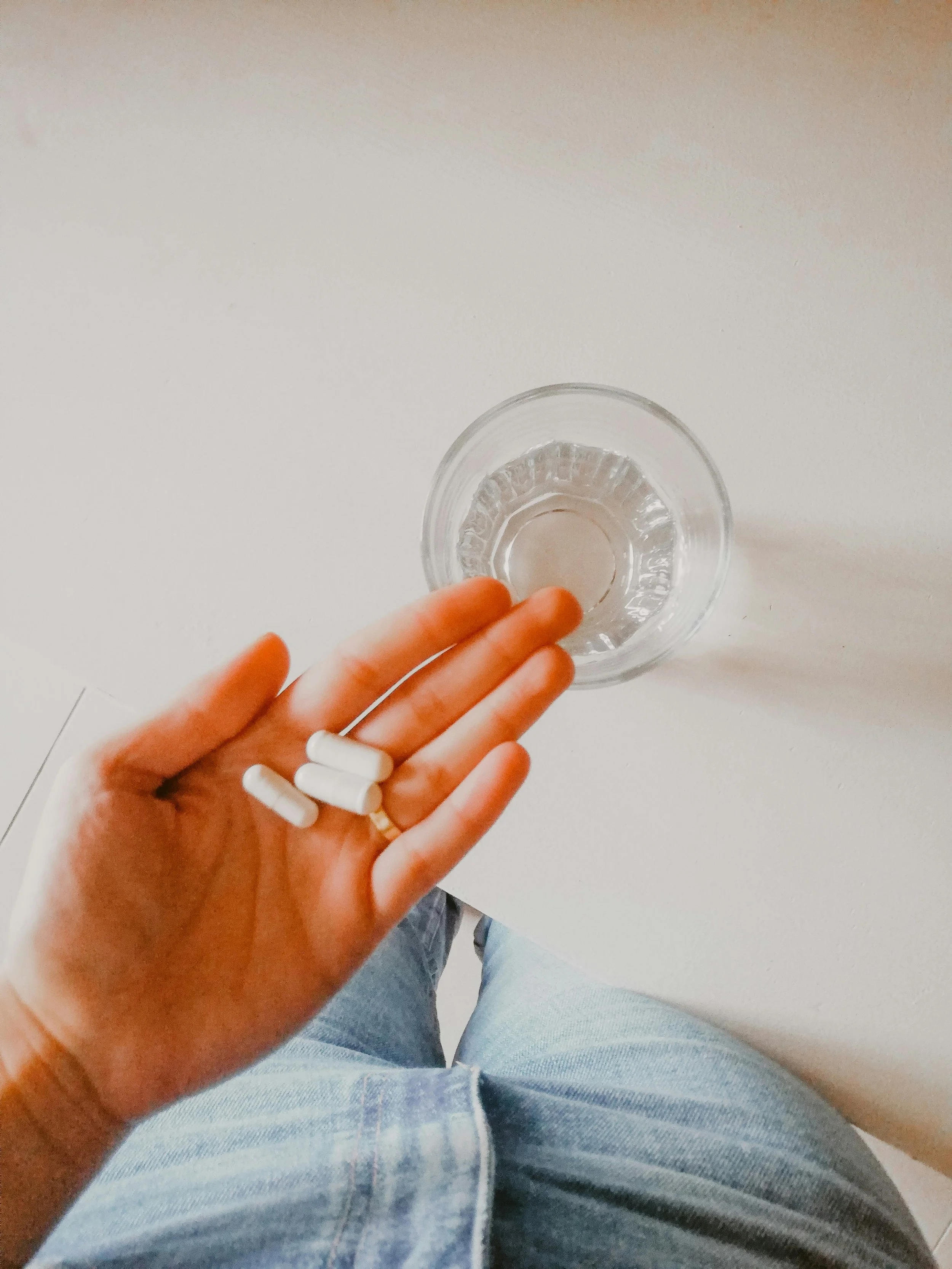Top Dietitian-Approved Third-Party Supplements
Ever stood in the supplement aisle overwhelmed by all the shiny bottles and grand claims — and wondered which ones are safe, effective, and actually worth taking?
In a largely unregulated market, third-party testing is one of the best ways to ensure quality, purity, and transparency. Below, I’m sharing my top dietitian-approved, third-party tested supplements, what they’re best for, and how to choose them wisely.
Get 15% off Thorne Vitamins and Supplements here.
What Third-Party Testing Really Means & Why It Matters for Your Safety
Third-party tested supplements are evaluated by independent organizations that verify:
The ingredients listed on the label match what's actually inside.
There are no harmful contaminants (like heavy metals or microbes).
The product was manufactured in a GMP (Good Manufacturing Practice)-certified facility.
Common Third-Party Testing Organizations:
NSF Certified for Sport– Verifies ingredient accuracy, purity, and safety. Often displayed on label.
USP Verified – Confirms identity, strength, and quality. Trusted for basic vitamins + minerals.
Informed Choice – Tests for banned substances — great for athletes.
ConsumerLab – Independent lab results available online.
These seals ensure quality, transparency, and peace of mind.
Why Dietitians Prefer Third-Party Tested Supplements
As a registered dietitian, I prioritize safety, bioavailability, and clinical effectiveness. Third-party tested products:
Contain exactly what they say they do.
Avoid fillers, artificial dyes, and banned substances.
Are less likely to interact poorly with medications or health conditions.
If you're looking for evidence-based nutrition support, check out my nutrition counseling services or 1:1 nutrition counseling through Nourish.
How to Verify a Supplement’s Third-Party Certification Yourself
Look for Certification Seals:
NSF: Verified for sport and purity.
USP: Independent verification of identity, strength, and quality.
Informed Choice: Screens for banned substances.
Red Flags to Watch For:
"Proprietary blends" without detailed dosages.
No information about testing or certification.
Lack of transparency about manufacturing practices.
Top 10 Dietitian-Approved, Third-Party Tested Supplements
Here are the supplements I recommend again and again to my clients—and take myself.
1. Thorne Magnesium Bisglycinate
Certified by: NSF Certified for Sport
Best for: sleep support, muscle relaxation, stress recovery
Target goal: gentle magnesium that’s less likely to cause GI upset
Avoid if: you already consume magnesium-rich foods daily or have loose stools
2. Pure Encapsulations Omega-3 Ultra
Certified by: IFOS
Best for: heart, hormone, brain health
Target goal: concentrated EPA/DHA with minimal fillers
Avoid if: you follow a strict vegan diet (choose algal omega-3 instead)
3. NOW Foods Zinc Picolinate
Certified by: UL/NPA GMP
Best for: immune support, skin health, metabolism
Target goal: highly absorbable zinc form
Avoid if: you are taking copper supplements concurrently (zinc can affect copper balance)
4. Thorne Vitamin D + K2
Certified by: NSF GMP
Best for: bone health, immune function, low-sun exposure lifestyles
Target goal: support calcium absorption and utilization
Avoid if: you already have high vitamin D levels without deficiency
5. Garden of Life Multivitamin
Certified by: USDA Organic, NSF
Best for: plant-based nutrition, antioxidant support, greens intake
Target goal: convenient micronutrient and phytonutrient boost
Avoid if: you prefer single-ingredient supplements or minimal blends
6. Nordic Naturals Ultimate Omega
Certified by: IFOS
Best for: inflammation, brain health, fertility and pregnancy support
Target goal: highly purified omega-3s with great taste
Avoid if: you dislike flavored oils or need a vegan omega-3 option
7. Vital Nutrients Iron-C
Certified by: GMP, third-party tested
Best for: low iron, heavy periods, postpartum recovery
Target goal: improve iron absorption with added vitamin C
Avoid if: you don’t have iron deficiency or have iron overload risk
8. Thorne Craving & Stress Support
Certified by: NSF
Best for: energy, stress support, nervous system health
Target goal: replenish B-vitamins depleted by stress
Avoid if: B-vitamins trigger headaches or overstimulation for you
9. Jarrow Formulas B-Right Complex
Certified by: NSF GMP
Best for: methylation support, energy, nervous system health
Target goal: active B-vitamin forms for absorption
Avoid if: you’re sensitive to methylated vitamins
10. Thorne Creatine
Certified by: NSF Certified for Sport
Best for: strength, muscle recovery, cognitive performance
Target goal: pure creatine without fillers or banned substances
Avoid if: you have kidney disease or have not cleared use with a clinician
You can find several of these on my Amazon Storefront.
Are Third-Party Tested Supplements Really Better?
Yes, and here's why:
Benefits Backed by Research:
A 2022 study in JAMA found that supplements without third-party testing were significantly more likely to contain contaminants.
According to the NIH Office of Dietary Supplements, third-party certification ensures identity, potency, and purity.
Harvard Health recommends seeking supplements with USP or NSF labels for added safety.
Frequently Asked Questions About Supplement Testing
Do third-party tested supplements work better?
Third-party testing confirms that a supplement contains what the label says and is free from harmful contaminants. It does not guarantee that the supplement will work for your specific health goal. Effectiveness still depends on the ingredient, the dose, your body, and whether it fits your needs.
What certifications should I look for?
The most trusted certifications include NSF Certified, USP Verified, Informed Choice/Informed Sport, IFOS (for fish oil), and ConsumerLab. These programs test supplements for ingredient accuracy, purity, and safety.
Are third-party tested supplements safer?
They are generally safer than products with no verification because they are independently checked for contaminants and label accuracy. However, “safer” doesn’t mean “risk-free.” Supplements can still cause side effects or interact with medications.
Can supplements interact with medications?
Yes. Even high-quality, third-party tested supplements can interact with prescription or over-the-counter medications. Always check with a healthcare provider before starting something new, especially if you take medications or have medical conditions.
Is organic the same as third-party tested?
No. “Organic” refers to how ingredients are grown, not whether the final product was tested for accuracy or contaminants. A supplement can be organic but not third-party tested, and vice versa.
Should everyone take supplements?
Not necessarily. Supplements are meant to support nutrition, not replace food. Some people benefit from targeted supplementation, while others may not need any. Personalized guidance is the best way to decide what’s right for you.
Ready to Build a Smarter Supplement Routine?
If you're struggling to figure out what supplements you actually need:
Explore my meal plans to ensure your diet is nutrient-rich first.
Use my nutrition guides to dive deeper into your health goals.
Book personalized nutrition counseling for one-on-one supplement support.
Final Thoughts: Your Health Deserves Quality
When it comes to supplements, trust and transparency should always come first. By choosing third-party tested supplements, you're making sure every capsule or gummy works for your body—not against it.
Your next step:
Review the labels in your cabinet.
Bookmark this list for your next order.
Prioritize food first. Supplements should supplement a healthy diet, not replace it.
Let’s take the guesswork out of your wellness routine—together.
Next, check out another blog: Why Third-Party Testing Matters for Supplements


